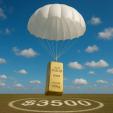Most U.S. Stocks Decline as Ukraine Conflict Deepens
San Francisco (Aug 15) Most U.S. stocks fell, trimming a weekly gain for the Standard & Poor’s 500 Index, after escalating tensions in Ukraine boosted demand for haven assets.
Nordstrom Inc. sank 5.1 percent after reporting sales that missed analysts’ estimates. Monster Beverage Corp. soared 30 percent after Coca-Cola Co. agreed to buy a stake in the company. Applied Materials Inc. jumped 5.6 percent after forecasting sales that may top analysts’ estimates.
About two stocks fell in the S&P 500 for each that rose. The U.S. equity benchmark slipped 0.1 percent to 1,953.10 at 3:10 p.m. in New York. It pared losses in the late afternoon, trimming a retreat that earlier reached 0.7 percent. The Dow Jones Industrial Average slid 57.12 points, or 0.3 percent, to 16,656.46.
“Investors are trying to weed through what exactly is going on in Ukraine, and the market is drifting back,” Stephen Carl, principal and head equity trader at New York-based Williams Capital Group LP, said in a phone interview. “We have a geopolitical situation that needs to be addressed, and that’s overshadowing everything else in the market.”
Ukrainian government troops attacked an armed convoy that had crossed the border from Russian territory, Andriy Lysenko, a spokesman for the country’s military, told reporters in Kiev. Ukrainian soldiers continue to come under shelling, including rounds fired from Russia, he said.
Traders work on the floor of the New York Stock Exchange (NYSE) in New York, on Aug. 11, 2014.
Aid Convoy
The Russian Foreign Ministry said in a statement that Ukraine is attempting to disrupt an aid convoy, and called for a cease-fire to allow delivery of supplies.
The government in Kiev has for months said that separatist rebels in its easternmost regions are receiving support from Russia, which backs them with artillery fire. Russia has repeatedly denied any involvement in the Ukrainian unrest.
Demand for haven assets rose, as the yield on the 10-year Treasury note sank five basis points to 2.34 percent, the lowest since June 2013.
The S&P 500 has risen 1.2 percent this week through yesterday on speculation the situation in eastern Europe had de-escalated. Trading in the index’s stocks was 3 percent above the 30-day average at this time of day.
The Chicago Board Options Exchange Volatility Index (VIX), which usually moves in the opposite direction to the S&P 500, jumped 9.7 percent to 13.63, halting five days of declines. The gauge has lost 14 percent this week.
Consumer Confidence
Equities had climbed earlier after mixed U.S. economic data stoked bets the Federal Reserve stimulus won’t be in a hurry to boost interest rates as it winds down its monthly bond-buying program. Industrial production advanced 0.4 percent in July, while the New York Fed Empire Manufacturing gauge fell more than estimated and consumer confidence unexpectedly declined to its lowest level of the year.
Separately, wholesale prices in the U.S. rose at a slower pace in July as fuel costs dropped by the most in eight months. Limited price pressures give the Fed room to maintain an accommodative position as its scales back monthly bond purchases.
Recent economic strength had created concern that the Fed may be forced to act on rates sooner than anticipated. The U.S. central bank remains on pace to wind down its monthly bond purchases in October. Fed Chair Janet Yellen has said officials will keep the benchmark rate low for a “considerable time” after the bond buying ends.
The Fed won’t reach its target of 2 percent inflation until 2018 because of continued weakness in the job market, Fed Bank of Minneapolis President Narayana Kocherlakota said in a speech today.
Earnings Scorecard
Nineteen S&P 500 companies, including Home Depot Inc. and Hewlett Packard Co., are scheduled to release earnings next week. About 76 percent of those that have reported so far this season have beaten analyst estimates for earnings, while 65 percent have exceeded sales projections, data compiled by Bloomberg show.
Nordstrom slid 5.1 percent to $65.21, the lowest since May. The largest U.S. luxury department-store chain reported same-store sales that missed estimates in the most recent quarter.
Monster Beverage soared 30 percent to a record $93.26. Coca-Cola agreed to swap some brands and buy a 17 percent stake in the company for about $2.15 billion, increasing its exposure to the growing energy-drink market. Coca-Cola added 1.8 percent to $40.89 for the biggest gain in the Dow.
Applied Materials jumped 5.6 percent to $22.32. The largest maker of semiconductor-manufacturing equipment forecast fiscal fourth-quarter sales that may top estimates as it steals orders from rivals demand rises for machines that make displays.
Source: Bloomberg










